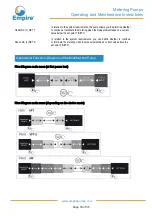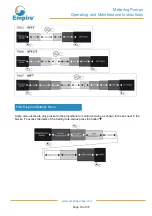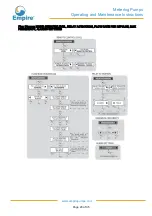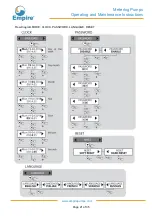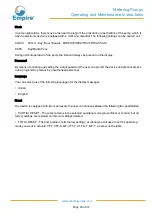
Page 9 of 35
Metering Pumps
Operating and Maintenance Instructions
www.empirepumps.com
Installation
Introduction
This section describes the steps for installing the pump, the pipes, and the electrical wiring. Read these
instructions carefully before beginning any activity.
Follow these guidelines when installing the pump.
•
Ensure that the pump and all related equipment is turned off before starting work.
•
If you encounter abnormalities or warning signals, stop immediately. Only start work again when you are
absolutely sure that you have removed the cause of the problem.
•
Do not install the pump in hazardous locations or in areas at risk of fire or explosion.
•
Avoid electrical hazards and fluid leakage. Never use a damaged or defective pump.
Pump installation
Install the pump away from heat sources and in a dry place at a maximum ambient temperature of 40 ° C.
The minimum temperature, not lower however than 0 ° C, depends on the type of liquid to be metered, which
must always remain in a liquid state. To fasten the pump use the supplied screw anchors, or those most
suited to the support type chosen.
The pump can be installed either above or below the liquid level in the tank. Usually in the case of
installation above the tank, limit the suction height to within 1.5 metres of the liquid level. (see fig. 2a). For
liquids that generate aggressive vapours, do not install the pump into direct contact with the fumes and
adopt the necessary precautions to prevent early deterioration of the equipment.
In the case of installation below, i.e. with the pump positioned below the liquid level of the tank (Fig. 2b),
siphoning may occur. Periodically check the functionality of the injection valve, as excessive wear may lead
to the additive falling into the plant even with the pump turned off. If the problem persists, fit a back pressure
valve C suitably calibrated between the metering pump and the injection point as shown in Fig. 2b
Fig 2a. Fig 2b.


















